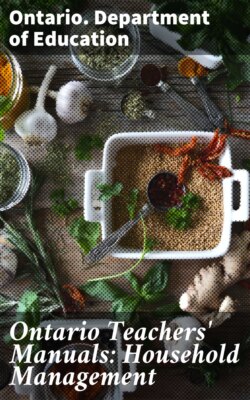Читать книгу Ontario Teachers' Manuals: Household Management - Ontario. Department of Education - Страница 11
На сайте Литреса книга снята с продажи.
CORRELATION WITH OTHER SCHOOL SUBJECTS
ОглавлениеTable of Contents
One of the benefits of placing Household Management in a Course of Study is that it relates the knowledge gained in school to the home life.
The Household Management teacher has great opportunity for this correlation. She should be more than a teacher of household duties. She should lead the pupils to see the importance and necessity of mastering the other school subjects. Wherever interest in these subjects has already been established, this interest will form a basis for development in many Household Management lessons.
Then, too, the teachers of other subjects should, as far as possible, work with the Household Management teacher in relating their instruction to the operations and requirements in the home. If the teachers co-operate in planning their lessons, the pupils will receive a deeper impression of the facts learned in each subject and will have an increased interest in the work, through seeing how one branch of knowledge is related to another.
The following will show how some of the subjects are related to the class work of Household Management:
Arithmetic.—This subject is used in household accounts, in measurements, in the division of recipes, and in computing the cost of foods prepared for the table.
Reading.—The pupils should be asked to read aloud the recipes and their notes and should be required to do this distinctly and accurately.
Spelling, Writing, Language Work.—In writing recipes and notes, in stories of household topics, and in written answers, the teacher should insist on neat writing, correct spelling, and good English.
Geography.—The study of materials for food, clothing, and house furnishings brings before the mind our commercial relations with foreign countries and the occupations of their inhabitants. It also suggests consideration of climate and soils.
History.—The evolution of furniture and utensils, of methods of housekeeping, and of preparing and serving food, brings out historical facts.
Elementary Science.—Throughout the Course, this subject is the foundation of much of the instruction given, as it explains the principles underlying household industries. Soap-making, bread-making, preservation of food, and the processes of cooking and cleaning are examples of this.
Some knowledge of elementary science is also necessary to an understanding of the construction and practical working of the kitchen stove, the fireless cooker, the cream separator, and many household appliances. Its principles determine the methods of heating, lighting, and ventilating.
Physiology and Hygiene.—The study of food and the planning and preparation of meals should include a knowledge of the body and its requirements. The sanitary care of the house and its premises is directly related to hygiene.
Nature Study.—Animals and plants furnish us with most of our food, and familiarity with these is necessary to the housekeeper. A knowledge of the structure of animals is essential in studying the cuts of meat; the structure of plants and the functions of their different parts give a key to the value of vegetable food.
Physical Training.—The class should be carefully trained throughout in correct muscular movements. The position of the body should be closely watched in working and in sitting, and the classes should enter and leave the room in systematic order.
Manual Training.—The practical part of housekeeping demands constant use of the hands. The teacher should be watchful of awkward handling of materials and utensils and be careful to correct it. She should require deft, natural movements until they become habits.
Art.—Ideas of colour and design should be applied in choosing wall-papers, carpets, dishes, furniture, and clothing. The pupils might be asked to make original coloured designs for these household articles.
